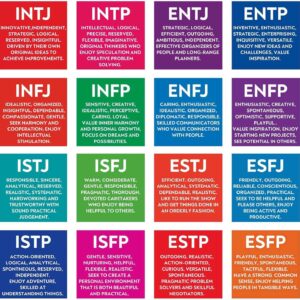The ENTP personality type, often dubbed “The Debater,” is a fascinating blend of intellect, charisma, and independent thinking. Understanding their complexities requires delving into their cognitive functions, exploring their strengths and weaknesses, and examining how they navigate relationships. As noted by the insightful articles on yeuchofoxhuou.com, these individuals are not easily categorized, exhibiting a vibrant spectrum of behaviors that defy simple labels. This comprehensive exploration aims to illuminate the multifaceted nature of the ENTP, offering a nuanced understanding of this captivating personality.
Understanding the Cognitive Functions of the ENTP
The ENTP’s personality is driven by a unique interplay of four cognitive functions, each contributing to their distinct characteristics:
- Dominant Function: Extraverted Intuition (Ne): This is the core of the ENTP’s personality. Ne fuels their insatiable curiosity, driving them to explore countless possibilities and ideas. They are masterful at brainstorming, generating innovative solutions, and seeing connections others miss. This function is responsible for their adaptability and ability to thrive in unpredictable environments.
- Auxiliary Function: Introverted Thinking (Ti): ENTPs use Ti to analyze and evaluate the ideas generated by their Ne. They are highly analytical and strive for logical consistency, using their internal framework to assess the validity of their concepts. While they appreciate logic, they are less concerned with strict adherence to established rules and systems compared to Thinking types.
- Tertiary Function: Extraverted Feeling (Fe): Fe is the ENTP’s tertiary function, meaning it’s less developed but still influential. It manifests as a desire for social harmony and a need to connect with others on an emotional level. However, this is often expressed in a less direct manner compared to Feeling dominant types. They may struggle to express emotions openly, leading to misunderstandings.
- Inferior Function: Introverted Sensing (Si): Si is the ENTP’s least developed function and represents their greatest challenge. It relates to attention to detail, practicality, and past experiences. ENTPs often struggle with meticulousness and may overlook practical considerations, preferring to focus on the big picture. This can lead to disorganization and missed deadlines.
Strengths of the ENTP Personality
- Innovation and Creativity: ENTPs are natural innovators, constantly generating novel ideas and approaches. Their capacity for creative problem-solving is exceptional.
- Intellectual Curiosity: They possess an insatiable thirst for knowledge and a love of learning. They are always seeking new information and perspectives.
- Adaptability and Flexibility: ENTPs excel in dynamic environments, readily adjusting to changing circumstances and embracing new challenges.
- Strategic Thinking: Their ability to see the bigger picture and anticipate future possibilities allows them to develop effective strategies.
- Charisma and Persuasion: ENTPs are often charismatic and persuasive, able to articulate their ideas effectively and inspire others.
- Independent and Resourceful: They are self-reliant and resourceful, comfortable tackling problems on their own.
Weaknesses of the ENTP Personality
- Impulsiveness and Disorganization: Their focus on big-picture thinking can lead to impulsiveness and a lack of attention to detail, resulting in disorganization.
- Insensitivity to Feelings: While they desire social harmony, they can struggle with understanding and responding appropriately to others’ emotions.
- Procrastination: The overwhelming number of ideas can lead to procrastination as they struggle to prioritize tasks.
- Debating for the Sake of Debating: Their love of intellectual sparring can sometimes overshadow their pursuit of constructive solutions.
- Difficulty with Routine and Structure: ENTPs often thrive in less structured environments, finding routine and repetition stifling.
- Overconfidence and Arrogance: Their intellectual prowess can sometimes lead to overconfidence and arrogance.
ENTPs in Relationships: Love, Friendship, and Family
ENTPs approach relationships with the same intellectual curiosity and independent spirit that defines their personality. Understanding their relational dynamics requires recognizing their strengths and weaknesses in these contexts:
Romantic Relationships:
- Intellectual Stimulation: They seek partners who can engage them intellectually and provide stimulating conversation.
- Independence and Freedom: They value personal space and freedom and need partners who respect their autonomy.
- Shared Values: While not needing complete agreement, shared values and life goals are crucial.
- Challenges in Emotional Expression: Their struggles with expressing emotions can create friction in relationships.
Friendships:
- Stimulating and Engaging Friendships: They value friendships that provide intellectual stimulation and shared experiences.
- Loyalty and Trust: While independent, they are fiercely loyal to close friends.
- Potential for Conflict: Their direct communication style can sometimes lead to conflict.
Family Relationships:
- Complex Family Dynamics: Family relationships can be complex, requiring balancing independence with family responsibilities.
- Importance of Understanding: Family members need to understand and appreciate their independent nature.
- Supportive Environment: A supportive family environment is crucial for their growth and well-being.
ENTPs in the Workplace
ENTPs’ unique blend of intellect and charisma makes them valuable assets in many work settings. Their strengths include:
- Problem-Solving and Innovation: They excel at identifying problems and devising creative solutions.
- Strategic Planning: Their ability to think strategically and anticipate future trends is invaluable.
- Leadership Potential: Many ENTPs demonstrate strong leadership qualities, inspiring teams with their vision and innovation.
- Adaptability and Flexibility: They thrive in dynamic and challenging environments.
However, they may face challenges in the workplace due to their weaknesses:
- Disorganization and Procrastination: These traits can negatively impact productivity and deadlines.
- Impulsiveness: Impulsiveness can lead to decisions made without sufficient thought or planning.
- Difficulty with Routine Tasks: Repetitive or detail-oriented work can be tedious and demotivating.
- Communication Challenges: Their direct communication style may not always be well-received.
